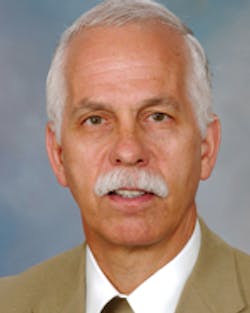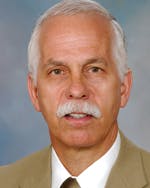Developing blood biomarker tests for the detection of cancer
Professional:
National Jewish Health, Denver, CO—five years. Mayo Clinic, Rochester, MN—28 years. Memberships: American Society of Clinical Oncology; International Association for the Study of Lung Cancer; American Thoracic Society; American
College of Chest Physicians.
Education:
BS: Southeast Missouri State University MD: University of Missouri, Columbia Mayo Clinic: Internal Medicine specialty and Pulmonary Medicine subspecialty.
Personal:
Volunteer: Co-chair Lung Cancer Task Force, State of Colorado; National Scientific Advisory Committee for American Lung Association. Hobbies and interests: International and adventure travel, biking, and hiking.
If you were explaining Oncimmune to someone who is not familiar with the organization, how would you characterize its areas of expertise? What major categories of solutions does Oncimmune provide for its customers? Oncimmune is a biotech company specializing in blood biomarker tests for the early detection of various cancers. The first major focus has been on the early detection of lung cancer. More specifically, Oncimmune specializes in detection of autoantibodies against cancer antigens in order to build a panel of autoantibodies that serve as a blood biomarker test for early detection of specific cancers. Its first autoantibody biomarker panel is for the detection of lung cancer before it becomes symptomatic, and it is called EarlyCDT-Lung. This test is a panel of seven autoantibodies to cancer antigens. If one or more of the autoantibody levels is elevated, then the test is considered positive.
You became Chief Medical Officer for Oncimmune in January. What will be your primary responsibilities and challenges in your new position? My major focus will be to assist in the further development and refinement of the EarlyCDT-Lung biomarker test for use in screening of high-risk individuals for lung cancer, and for assessing the risk of malignancy in non-calcified or indeterminate pulmonary nodules. The challenge of any biomarker is to make sure that it is sensitive and specific enough that it aids practicing physicians in their decision-making over and above the clinical risk profiles. Equally challenging will be the education of practicing physicians as to how the biomarker test can optimally assist them in the decision-making process.
Prior to your appointment as Oncimmune CMO, you worked on a clinical trial offered at National Jewish Health utilizing the EarlyCDT-Lung test. Can you tell us about this trial? I was the principal investigator on a clinical trial that was assessing the utility of adding the EarlyCDT-Lung blood test to low-dose CT scan screening of high-risk individuals. That trial is ongoing and has more than 1,000 individuals enrolled to date. The plan is to enroll a total of 1600 participants.
What were the results of the trials? What insights were gained that may enhance their value to oncologists and to the clinical laboratory? The results to date are preliminary but suggest that the risk of lung cancer is elevated approximately fivefold if the blood test is positive. This is in a cohort of individuals who are already at high risk for lung cancer due to their age and smoking history. These early results support the results of a previously published clinical use audit which showed a fivefold increased risk of lung cancer in individuals with a positive test.
The autoantibodies in the EarlyCDT-Lung blood test have been shown to be positive in all stages of lung cancer including the earliest, Stage I. Preliminary data has shown the blood test to be positive one to two years before the clinical diagnosis of lung cancer in some cases. Two ongoing prospective clinical trials are in progress to further clarify the ability of the test to detect lung cancer before individuals develop signs and symptoms of disease.
Will the approach be applicable to other kinds of solid-tumor cancers as well? Is Oncimmune developing blood autoantibodies assays for other cancers? The EarlyCDT-Lung autoantibody biomarker approach is theoretically applicable to most cancers. However, the cancer antigens expressed on different cancers can vary greatly. Also, the extent of their expression for developing an autoantibody response will vary. Additional autoantibody blood tests for early detection of other cancers are in development. Oncimmune is in the process of developing a blood autoantibodies test for hepatocellular carcinoma (liver cancer), and preliminary work is underway for ovarian cancer.
You spent many years serving at the Mayo Clinic (Rochester) before moving on to National Jewish Health and now Oncimmune. How does your career as a top clinician and researcher help you function more effectively in your industry capacity? For more than 30 years the focus of my career has been on early detection, diagnosis, and treatment of lung cancer as well as other malignancies of the chest. During this time period I have been privileged to interact and collaborate with top physicians in the lung cancer field. Through this exposure to critical thinkers and my own clinical practice, I have become aware of the high bar set for biomarkers to be of clinical usefulness. Additionally, I have credibility and contacts within the lung cancer field. This will allow Oncimmune to develop a registry study for indeterminate pulmonary nodules and other potentially necessary prospective clinical trials. The acquired knowledge gained from these lung cancer clinical trials will translate to other malignancies.


